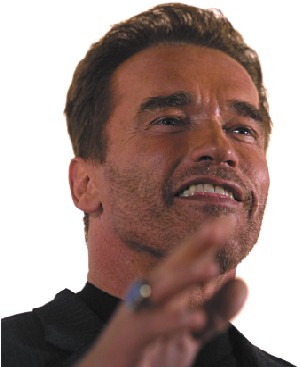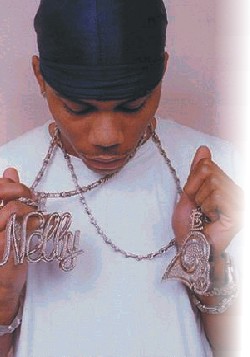B
L A M E !
m
a n g a r e v i e w
By
[email protected]
It's
a manga (a Japanese comic) called "Blame!", by Tsutomu Nihei
(not to be confused with BLAME, by the same author). I'm holding off
final judgment since I'm still in the middle, but what I've read so
far is very good. It's intensely cyberpunk, set in what is probably
the distant future or possibly on another planet. Unlike Ghost In
The Shell/Matrix/Neuromancer style cyberpunk, which keep bombarding
you with cool toys, this story shows you very few toys, gives you
even less jargon, and instead makes you hunger for the next little
bit of info about what happened, who the characters really are, who
the sides in conflict are and what is going on.
The
manga is drawn in a really rough and ready, gritty style that takes
some getting used to, with pages and pages of almost surrealistic
violence, silent exploration of vast areas, and occasional encounters
with strange creatures and people. The fact that at times almost a
hundred pages go by without a word being said really contributes to
the feeling of being lost in the strange world portrayed by Nihei.
At times it looks like Nihei can't draw; his characters have such
distorted faces and figures. But for the important scenes, everything
is perfect. Heavy ink/pencil work, no shading or coloring, but very
impressive. And the overall artwork improves quite a lot in the later
volumes. And man can he portray action well. The best action scenes
may require several long seconds of being stared at to figure out
who did what to whom and in what order, but they convey the impression
of motion a lot better than many other comics.
But
never mind the art, it's the story that's impressive. After about
three volumes, a plot starts to seem visible, and it continues to
develop well through to Volume 8 (beyond that I don't know, because
the later volumes are still being translated to English). With the
bare minimum of explicit explanation, Nihei explores cyberpunk themes
that I can't remember coming across in any other sci-fi/cyberpunk
fiction I've read/watched/played.

I
see three possible ways the story can go:
A: It'll all tie together in the end into a masterful story.
B: I'll tie together as rubbish like most stories that keep introducing
wonder after wonder without worrying how it'll be explained later
C: it'll keep going on and on, volume after volume, getting further
and further, postponing the inevitable disappointment in the end.
I was hoping for option C, since its fun reading but sadly, I hear
rumors that it will end around Volume 11, so I have my fingers crossed
for a good ending.
Did
I mention how scary it can get? There've been at least 2 scenes in
which, as soon as I saw the panel (no dialogue on either), the sudden
realization of the proximity of danger made all the fine hairs on
the back of my neck shoot up. a friend of mine says it scares him
because of a recurring nightmare he has, "where you're trapped
in a giant city with really small rooms that just lead to more, tiny
rooms that are too small for you to even stand up in… And then, the
rooms just go on forever… or it reaches out into space or something.
And you're all alone, and you go insane and…". I don't know what
bizarre nightmare he's talking about, I've never had one like that,
but if you've had such a nightmare, this is definitely the story to
make you remember it.

Now
for some technical info. The manga is available for download in English
at http://www.omanga.net/?cid=blame . Download the ZIP files, and
inside are the images of the pages. Before you read Blame!, you might
want to also download Noise from the same website [ http://www.omanga.net/?cid=noise
], which is a short single-volume prelude by the same author (it's
got the first scary scene I mentioned).
If
you're new to reading Japanese comics, Blame! is quite a gentle starter,
because the first three volumes are translated from the French version,
which has French sound-effects and panels you read in the usual left-to-right
order of American comics. only the later volumes have sound effects
written with Japanese characters and panels arranged for right-to-left
reading (by the time you get to volume 4, you'll probably be willing
to adjust to the changed reading order). there's none of the nudity
and little of the violence (well, a lot of computer programs and cyborgs
destroying each other, quite disturbing imagery, but little harm to
humans) some people associate with Japanese comics. Finally, the scarcity
of dialogue means that you can read it very quickly - a friend of
mine read eight volumes (52 chapters) in just two days, and I'm sure
he could have done it faster if he tried.
Schwarzenegger:
The Actor, The politician

Meet
Arnold the actor
While his police-chief father wanted him to become a soccer player,
Austrian-born actor Arnold Schwarzenegger opted instead for a bodybuilding
career. Born July 30, 1947, in the small Austrian town of Graz, it
wasn't until he was 15 that he discovered weightlifting. And by the
age of 20 was awarded the Mr. Universe title. He later won 13 world
body building records (including Mr. Olympia) and then came to the
U.S. for body-building exhibitions, billing himself immodestly but
fairly accurately as "The Austrian Oak." Though his thick
Austrian accent and slow speech patterns led some to believe that
the Austrian Oak was shy a few leaves, Schwarzenegger was, in fact,
a highly motivated and intelligent young man. After graduating from
the University of Wisconsin with a degree in business and economics,
he invested his contest earnings in real estate and a mail-order bodybuilding
equipment company.
A millionaire
before the age of 22, Schwarzenegger decided to try acting. Producers
were impressed by his physique but not his mouthful of a last name,
so it was as Arnold Strong that he made his film bow in the low-budget
spoof Hercules in New York (1970) (with a dubbed voice). He reverted
to his own name for the 1976 film Stay Hungry, then achieved stardom
as "himself" in the 1977 documentary Pumping Iron. In The
Villain (1979), a cartoon-like Western parody, he played "Handsome
Stranger," exhibiting a gift for under-stated comedy that would
more or less go unexploited for many years thereafter. With Conan
the Barbarian (1982) and its sequel, Conan the Destroyer (1984), the
actor established himself as an action star, though his acting was
backtracking into two-dimensionality (understandably, given the nature
of the Conan role). As the murderous android title character in The
Terminator (1984), Schwarzenegger became a bona fide box-office draw,
and also established his trademark of coining repeatable catch phrases
in his films: "I'll be back," in Terminator, "Consider
this a divorce," in Total Recall (1990), and so on.
As Danny De Vito's
unlikely pacifistic sibling in Twins (1988), Schwarzenegger received
the praise of critics who noted his "unsuspected" comic
expertise (quite forgetting The Villain). In Kindergarten Cop (1991),
Schwarzenegger played a hard-bitten police detective who found his
true life's calling as a schoolteacher (his character was a cop only
because it was expected of him by his policeman father, which could
have paralleled his own life). Terminator 2: Judgment Day (1991),
wherein Schwarzenegger exercised his star prerogative and insisted
that the Terminator become a good guy, was the most expensive film
ever made up to its time -- and one of the biggest moneymakers. The
actor's subsequent action films were equally as costly; sometimes
the expenditures paid off, while other times the result was immensely
disappointing -- for the box-office disappointment Last Action Hero
(1992), Schwarzenegger refreshingly took full responsibility, rather
than blaming the failure on his production crew or studio as other
"superstars" have been known to do.
A rock-ribbed
Republican despite his marriage to JFK's niece Maria Shriver (with
whom he has four children), Schwarzenegger was appointed by George
Bush in 1990 as chairman of the President's Council of Physical Fitness
and Sports, a job he took as seriously and with as much dedication
as any of his films. A much-publicized investment in the showbiz eatery
Planet Hollywood increased the coffers in Schwarzenegger's already
bulging bank account. Schwarzenegger then added directing to his many
accomplishments, piloting a few episodes of the cable-TV series Tales
From the Crypt as well as a 1992 remake of the 1945 film Christmas
in Connecticut.
Schwarzenegger
bounced back from the disastrous Last Action Hero with 1994's True
Lies, which, despite its mile-wide streak of misogyny and its gaping
plot and logic holes, was one of the major hits of that summer's movie
season. Following the success of True Lies, Schwarzenegger went back
to doing comedy with Junior, co-starring with Emma Thompson and his
old Twins accomplice Danny De Vito. The film met with critically mixed
results, although it fared decently at the box office. Undeterred,
Schwarzenegger continued down the merry, if treacherous, path of alternating
action with comedy with 1996's Eraser and Jingle All the Way, the
latter of which proved to be both a critical bomb and a box-office
disappointment. In a move that suggested he had realized that audiences
wanted him back in the world of assorted weaponry and explosives,
Schwarzenegger returned to the action realm with 1997's Batman &
Robin, which unfortunately proved to be a huge critical disappointment,
although, in the tradition of most Schwarzenegger action films, it
did manage to gross well over 100 million dollars at the box office,
and over 130 million dollars more the world over.
The
turn of the century found Schwarzenegger's star losing some of its
luster with a pair of millennial-paranoia films, 1999's End of Days
and 2000's The 6th Day. The former film -- in which a security consultant
has to save the world from Satan -- was critically lambasted and,
despite a powerful opening weekend, failed to recoup its cost in the
States. The latter film -- a cloning parable which bore more than
a passing resemblance to Total Recall -- received more positive notices,
but took in less than half the receipts Days did just one year prior.
Perhaps as a response to these failures, Schwarzenegger prepped three
films reminiscent of former successes, all scheduled for release in
2001 and 2002: the terrorist action thriller Collateral Damage, True
Lies 2, and the long-anticipated Terminator 3. And though Collateral
Damage received a chilly reception at the box office and the development
of True Lies 2 fell into question, longtime fans of the cigar chomping
strongman rejoiced as the Terminator 3 opened in theatres this summer.

Enter
Arnold the politician
Arnold Schwarzenegger's leap into the recall campaign against Gov.
Gray Davis gives the Republican Party a candidate with name recognition
that is second to none - but also one with little previous political
experience.
Until he announced Wednesday night on "The Tonight Show With
Jay Leno" that he was running in the Oct. 7 election, the action
movie hero's sole foray into California politics was drafting a successful
ballot initiative to provide as much as $550 million a year to before-
and after-school programs.
"I speak
directly to the people, and I know that the people of California want
to have better leadership," the body-building-champion-turned
movie star told reporters after his announcement.
Schwarzenegger's
candidacy is sure to draw comparisons to Ronald Reagan, who parlayed
his on-screen popularity into the California governorship and later
the presidency of the United States. But Reagan had been politically
active and served as president of the Screen Actors Guild before his
run for governor in 1966.
Schwarzenegger's
celebrity status is no guarantee of success at the polls, either.
A recent poll found Schwarzenegger was in second place behind Los
Angeles Mayor Richard Riordan when likely voters were asked to choose
from six potential candidates.
His popularity
at the box office is another matter - as a cyborg from the future
or a supersized everyman seeking vengeance, Schwarzenegger has firmly
landed himself in the $20 million club of A-list movie stars. He earned
about $30 million for "Terminator 3: Rise of the Machines,"
released last month.
Schwarzenegger's
candidacy will certainly subject the 56-year-old actor to withering
attacks from Davis allies, who gave him a taste of the harsh spotlight
in the political arena when he was contemplating entering last year's
governor's race.
A Davis strategist
bombarded newsroom fax machines with articles about Schwarzenegger's
alleged groping and womanizing. The actor denied the claims, and some
of his co-stars came to his defense.
On Wednesday,
Schwarzenegger said he would not be deterred by Davis allies attacking
him, adding, "I know that they're going to throw everything at
me."
Last year's re-release of the film Hercules in New York also brought
scrutiny when it was noted that Schwarzenegger, then preparing to
defend one of his bodybuilding titles, was seen smoking marijuana
in one scene.
"I did smoke
a joint and I did inhale," he told The Associated Press at the
time. "The bottom line is that's what it was in the '70s, that's
what I did. I have never touched it since."
Several other
films that show Schwarzenegger engaging in over-the-top movie mayhem
- including the "Terminator" movies - might also be singled
out for criticism during a campaign.
Still, he is considered
a formidable contender because of his ability to draw international
media attention, his personal wealth and his unbeatable name recognition.
"As you know, I don't need to take any money from anybody. I
have plenty of money myself," he told reporters Wednesday. "I
will make the decisions for the people."
He was said to
be hesitant about entering the campaign after the recall qualified
for the ballot July 23; advisers said his wife, journalist Maria Shriver,
was cold to the idea.
"Well, we
went back and forth, you know, and we wanted to consider all the ups
and downs of a campaign like that and of a job like that," Schwarzenegger
told "Access Hollywood" after his announcement. "When
I do something I do it 100 percent and dive in there with my whole
heart."
As a member of
the nation's most prominent Democratic family - the daughter of Eunice
Kennedy Shriver and former vice presidential candidate Sargent Shriver
- Schwarzenegger's wife is keenly attuned to the risks of a life in
politics.
The couple have
four children, ranging in age from 5 to 13.
In an AP interview
last year, Schwarzenegger smoked a cigar and said he has been in good
health after undergoing surgery to replace a heart valve in 1997.
"That's the great thing about this country, that as a foreigner,
`Mr. Schwarzen-Schnitzel, '" he said with a laugh, "I can
come here and say, `Maybe some day I'm going to run this state.' It's
a big state. Then we can buy Austria.”
NELLY
OF NELLYVILLE

Nelly
is one of the hottest young rap/hip hop artists of today and his song
Country Grammar has become somewhat of an anthem for teens everywhere.
Nelly,
born Cornell Haynes, Jr., spent his early years in Spain and moved
to St. Louis, Missouri for elementary school. His parents divorced
when he was eight years old. He nearly succumbed to the all-too-familiar
dangers and temptations of life on the street. He avoided that trap
thanks to his mother, who moved to nearby University City. Surrounded
by the positive influences and safety of suburbia, Nelly got involved
in sports and also discovered the power of storytelling through rhyme.
Nelly admitted he used to get into a lot of fights but by the time
he started high school he was into baseball instead. His passion for
baseball helped keep him out of trouble.
In
1996, Nelly hooked up with some high school friends and formed the
St. Lunatics. Their first single, "Gimmie What You Got,"
became a local hit, and the group (which also includes Big Lee, Kyjuan,
Murphy Lee and his little brother City Spud) thought a record deal
would soon follow. Without any solid bites, however, the St. Lunatics
made an executive decision. Nelly would fly solo to help put St. Louis
on the map. The Lunatics were right. Nelly quickly caught the attention
of Universal, who released his debut album, Country Grammar, in 2000.
Two
years later Nelly and crew released a 12-inch single called Gimme
What Ya Got which sold almost 10,000 copies. He continued with the
Lunatics while playing shortstop in the St. Louis Amateur Baseball
Association. It looked as though Nelly would be a professional baseball
player.

The
St. Lunatics managed to put out another song called Who's The Boss
which became a local hit. The song helped their reputation locally
but didn't grab the interest of record companies. The frustrated St.
Lunatics decided to try their luck in Atlanta and teamed up with Kula
who was managing Courtesy of Fox Mase at that time. Eventually they
realized Nelly would have a better chance of scoring a record deal
on his own. So with Kula, 19 year-old Nelly attracted Universal Records
exec Kevin Law in 1999.
Nelly's
career was off like a rocket with the release of his song Country
Grammar which borrows the hook from the children's song Down, Down,
Baby. The single even cruised to the top of the Billboard charts after
it was released in February of 2000. On June 6, 2000, Nelly released
his first full-length album - also called Country Grammar. The album
managed to sneak past Eminem and Britney to the number one spot on
the Billboard charts on Aug. 26. It succeeded in putting both Nelly
and St. Louis on the hip-hop map. The singles "Country Grammar"
and "Ride Wit Me" helped earn Nelly two Grammy Awards for
Best Rap Solo Performance, one Grammy for Best Rap Collaboration,
and one Grammy for Best Rap Album. With massive solo success under
his belt, Nelly did not forget his posse. He rejoined the St. Lunatics,
who released Free City in 2001.
In
2002, Nelly (whose signature style now included wearing sports jerseys
backwards and a Band-Aid on one of his cheeks) owned the airwaves
and dominated multiple Billboard charts thanks to the multi-platinum
Nellyville and the hit singles, "Hot in Herre" and "Dilemma,"
featuring Kelly Rowland from Destiny's Child. Looks like this rapper
will continue spittin' rhymes and ridin' wit the big boys of rap.
